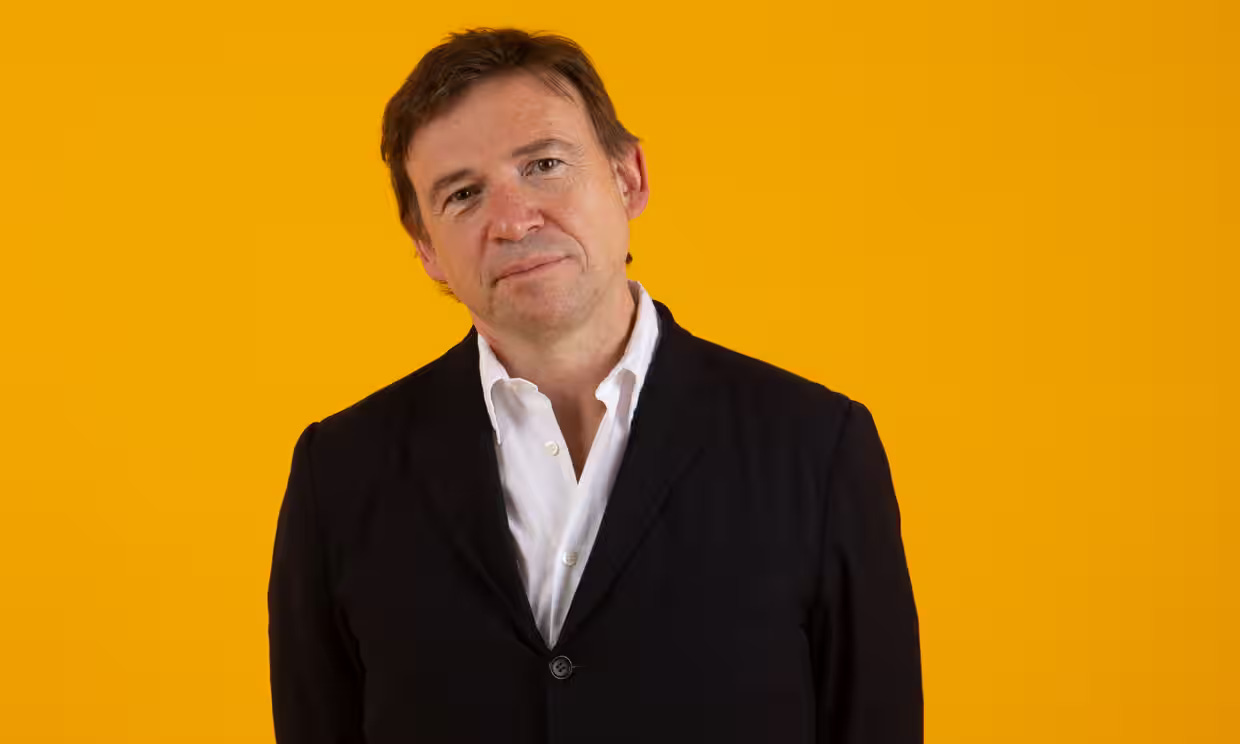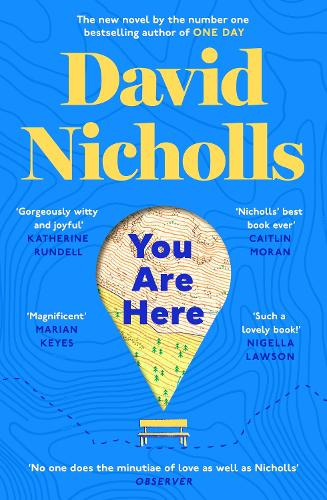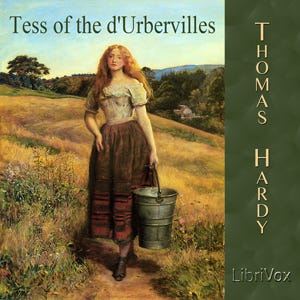February is Movement Month on Changes and I’m delighted to bring you the first of several writers interviews that I will post this month, in which writers discuss how exercise and body movement play into their writing processes.
David Nicholls is a hugely successful novelist and screenwriter who has written six novels, including Starter For Ten, Sweet Sorrow and Us, and won a BAFTA and an Emmy nomination for his work as a screenwriter. He is best known of course for his 2009 novel One Day which has sold six million copies, been made into a film and more recently, a Netflix series which reached the top 10 in 89 countries.
David Nicholls is an avid walker and hiker, and one of the first writers I thought of for this interview series, having devoured his latest book You Are Here last year, which tells the story of two middle aged divorcees falling in love as they embark on the two hundred mile Coast to Coast walk across the width of Britain. It’s a story about loneliness and the beginnings of love with the backdrop of England’s lakes and fells and relentlessly changeable weather. It’s an absolute masterclass in writing; warm, unsentimental, hilarious and so acutely observed.
I sent David some questions last week and he sent me his answers in the form of voice notes which I transcribed below.
David how much do you walk?
I walk all the time. I cycle to work every day, but I walk an awful lot in London. Everything's much closer than people think, and I often walk into the West End from Highbury, or if I'm working on a book and I need to think, I'll walk along the Thames somewhere between Richmond and Greenwich.
I love it. And as, as for the big walks, the big hikes, I try, I used to anyway, to go twice a year, once in the spring, once in the autumn. I've been doing that for about 10 years, probably since my father died. I think I needed some time to walk and think, and it felt instinctive really, the first big walk. It was up the Northumberland coast, a beautiful, beautiful stretch of coastline, and it was a huge help for me.
What happens in your head during a long walk? Is there a shifting of thoughts? A clearing? A rearrangement? I’m fascinated by the brain changes..
I guess if I'm hoping for anything, it's a kind of clearing of the decks. I think certainly if I'm suffering from feeling a little anxious or worried, what I really want is to find a sort of solitude and a clear headedness that I hardly ever get. Particularly given that I spend all day, nearly all day, every day in front of the computer and far too much of that on the internet.
I make sure my phone is inaccessible and I just walk and try and clear things out. It doesn't always work. I mean, often you just get trapped in the same kind of circular anxieties as I do sitting at my desk or at home in London. But, but every now and then you get a kind of a clarity.
The other version of that, I suppose is that sort of romantic poet idea of moments of clean, bright inspiration, new ideas and, and moments of almost the opposite, thoughtfulness, intense thoughtfulness. And that occasionally happens. Sometimes I can unlock a plot or unlock a story or get a new idea. But for the most part, for me, it's about an attempt to defeat stress and anxiety.
And I look forward to it so much. I can't tell you. It's my favourite part of the year really. Don’t tell my family.
What does walking do for you as a writer? How does it serve your process?
I think sitting at the desk all day every day is just paralysing really. You can get very stuffy. You can find yourself just going around in circles. If I am stuck, I will always, always, always go for a walk and, and get away from a screen. Often I'm working on adaptations of books. Years ago when I did the Patrick Melrose novels, I used to listen to the audio books over and over and over again. Have them playing so that it almost became like learning a song, you know, the way a song will go deep into your bones. I've always done that for every book I've adapted, and there comes a point where you just feel like you know it, you know it's structure and you can find your way around the text very quickly, and it kind of gets inside you.
So I think the rhythm of walking and the lack of electronic intrusion really helps me, both on adaptations and original stuff. I have a pen and paper in my pocket always, just in case something comes up. It doesn't usually, but I also take a lot of photographs and if I'm writing about a particular location, I will walk around there as much as I can till I feel like I can picture it in my head, and in case that fails, I will photograph everything.
So it's a really essential part of writing for me. Otherwise, you know, sitting in the same chair for eight hours a day, you need to shake things loose, I think.
Why did you want to write about walking in You Are Here? And why the Coast to Coast walk in particular?
I remember coming straight from one of my long walks. I think it was the Dale's Way, which is a big five day beautiful walk from East to West across the Dales. Beautiful, beautiful walk across the Pennines and then down to the lake. And I went straight from the train to a party, quite disheveled. It was a book party. And I explained where I'd been and that that was something I did two or three times a year, and the person I was speaking to said, oh, you should definitely write about that. And I've always wanted to write about it, but I'm wary of the kind of personal exposure that would be demanded, I think, to make that book interesting, to make it more than the guidebook.So I suppose I, I wanted to put the kind of passion I have for it and some of the stories as well, some of the experiences into fictional form.
And I prefer walking alone but I know lots of other people find walking in company to be very therapeutic, for there to be a particular kind of conversation that you have during walking. I did want to write about that strange kind of free flowing, uncensored conversation you have on a long walk with someone. It's a little like a long car drive. It's the lack of eye contact, I think, and the rhythm and the sheer number of hours that you have to fill, and there is a particular flavour and openness to conversation in the outdoors, in the open air. So that seemed like a nice theme.
It's very much a post covid book in that it's about two characters trying to escape that sense of claustrophobia. Do I mean claustrophobia? no, I think, I mean the opposite. I mean, agoraphobia, I think we all became a little bit frightened of outdoors and I certainly became very wary of conversation with other people and I wanted to write about shaking that off and learning to open up and, and to make contact with other people again. And it seemed to me that that would work much better in the open air than in a series of conversations in pubs and restaurants. So that was the inspiration.
Why this particular walk? It was because of the scale of it. I think, you know, these two people needed to fall in love and that wouldn't have worked in four days on the South Downs way. It needed to be quite isolated. It needed to be a substantial period of time. It needed to be the kind of walk where lots of things could go wrong as well as go right. So it needed sun and rain.
The coast to coast has a kind of mythology around it. You know, this whole business of picking up a stone in the West and carrying it all the way to the East seemed to symbolise the kind of letting go and throwing away that seemed to fit the characters.
It's a walk that has three acts. The biggest climbs were all at the beginning in the lakes, and I think, maybe I shouldn't say this, but the most beautiful landscape is there as well. And then the Dales is a sort of softer, gentler landscape apart from the bit where you climb over the Pennines. It's not so demanding. And that's the point of the story where they're getting to know each other and getting to open up a little. And then when things go wrong there, Michael suddenly is on the moors, which I love. And it has a kind of austere beauty that seemed to fit the darker part of the novel. So I love the way the landscape sort of matched the structure of the story I was trying to tell. And, and by doing the walk, of course you get all these ideas. You see the mountain lakes and you think what could happen here? And you stay in the terrible pub and you think, what would this be like for Michael and Marnie? So it was a kind of act of improvisation, I suppose, in the open air.
Do you have a favourite piece of literature on walking?
You know, years and years and years ago, I, I read those Patrick Lee Fermor books and it's a lovely idea. These great epic walks across Holland in Germany. I think they'd be quite grim walks now. But I'm very aware of that literature and I read a lot of Alfred Wainwright while I was writing the book, but the root of it for me, as in so many things, is probably in Dickens and Hardy.
I love those moments in say, David Copperfield, where the young David walks all the way from London to Kent. It's something that Dickens himself would do. Go on these great thirty mile walks often in the middle of the night. I love in Hardy there are a lot of rather desperate scrambles across the Moors and the Heathland.
There's a lot in Tess, a lot of that terrible moment where she has to walk in her best evening shoes through mud and snow. So walks always seem to be about key turning points in literature, they often have a kind of urgency to them. I remember reading Orwell. Orwell was a big writer for me and a lot of Down And Out In Paris And London is about the experience of tramping around the countryside.
I always liked the idea that you can open your door and leave and walk and something will happen. It’s something that I, from a very young age liked in literature. I think, you know, as a 15, 16-year-old, I was sort of hoping for a kind of poetic revelation that never really came because I grew up in a part of the country that was pretty ugly on the South Coast, sort of around Portsmouth. So it was something that I had a kind of yearning for, but we didn't have a car so there was no real way to experience it. So I walked a lot through railway yards and industrial estates and kind of muddy bits at the edge of the town hoping to become a poet, which never happened. But still, it was definitely there at an early age.
Do you enhance your walks with music? I’m interested in what you listen to ..
Oh my God. I have a mix tape called Private Pleasures, which if I put it on in the kitchen at home, would be turned off within seconds. And weirdly, it's a lot of stuff I listened to as a kind of anxious Adrian Mole-ish teenager. A lot of music that has a kind of weird pull and nostalgia for me. A lot of early Kate Bush and Peter Gabriel's solo albums and twenty six minute Genesis tracks and things that, that for some reason remind me of my youth. I'm not sure why, I am not at all nostalgic for my childhood, quite the opposite, but I like those moments of memory that a song will call up.
So yeah, I have several playlists of old songs that I listen to. But it's also for me a chance to catch up with new music. So I always download three or four new albums and listen to those. I remember reading a piece by Andrew Hagan, he talked about as a young man going for long walks in Scotland and listening to Kraut Rock, listening to old Can and Neu! albums and I can see why that fits as well.
Often you want music with a kind of drive. So I also have playlists that are kind of for that last push, playlists that are more electronic and upbeat and that sometimes helps, not always. And then I'll go back to the first Genesis album again. <laughs>








I love this! I have read some of his work and totally relate to him using walking as a way to decompress and generate ideas
Ever read Murakami's What We Talk About When We Talk About Running?